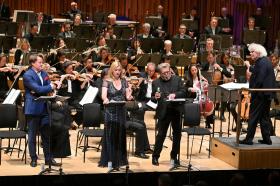The venerable philosopher Confucius stated “if one should desire to know whether a kingdom is well governed, or if its morals are good or bad, the quality of its music will furnish the answer.” One wonders what he would have made of the 20th century phenomenon known as world music.
People throughout the world perform and listen to music as a form of entertainment.
But music is also a serious business, transgressing political, social, religious and economic boundaries.
And nowhere is the cross-pollination more evident than in the genre commonly known as ”world music”
Looked at from one angle, world music is, as the term suggests, all the music in the world.
More succinctly, however, the term has come to be used primarily to classify any form of music that is not part of mainstream Western, commercial/popular music or classical music traditions, and which typically originates from outside the cultural sphere of Western Europe and the English-speaking nations.
The influence of “world music” on the mainstream musical firmament is pervasive. Mainstream music today has adopted many of its qualities, with artists as varied as Shakira and The Buena Vista Social Club reaching a much wider audience than their musical forbears could ever have hoped for.
Musicians from diverse cultures and locations can now readily access recorded music from around the world, see and hear visiting musicians from other cultures and visit other countries to play their own music, creating a melting pot of stylistic influences.
World music radio programs these days will often play African hip hop or reggae artists, crossover Bhangra and Latin American jazz groups – to name but a few. And through Internet broadcasts musicians are now able to access an instant global audience for their music – technology paving opportunities not dreamed of by their musical forbears.
This enlightened state of play, however, has not always been the case, and attitudes towards “world music” have undergone enormous change across the last decade.
The genre is in fact relatively new, with the “world music” phenomenon only really gaining momentum within the last two decades after an inauspicious beginning as a marketing genre in the late 1980’s.
One of the key supporters of the world music movement early on was musican Peter Gabriel, who helped create the highly influential music festival ”WOMAD” as a response to “pure enthusiasm for music from around the world”.
Says Gabriel, concerning the role of world music festivals like WOMAD, the Rainforest World Music Festival and the GrassRoots Festival of Music and Dance: “the festivals have also allowed many different audiences to gain an insight into cultures other than their own through the enjoyment of music…. Music is a universal language, it draws people together and proves, as well as anything, the stupidity of racism.”
Likewise, events such as the World Music Expo, (Womex) a gathering billed as “the world’s premier networking point exclusively dedicated to world, roots, folk, ethnic, traditional, local and diaspora music of all kinds,” have affirmed the “value and potential of networking across borders, be these musical, political, cultural or commercial.”
But this success has raised some very valid concerns. Many critics believe that while communication technology such as the Internet and advanced recording systems have allowed artists and audiences alike greater access to obscure forms of music, the pressures of commercialization also present the risk of increasing musical homogeny, the blurring of regional identities, and the gradual extinction of traditional local music-making practices.
What value is a “world music” that ends up sounding like everything else available on the market?
So too, not everyone is a fan of the attempt on the part of the music industry to relegate anything non-Western into the convenient (not to mention lucrative) marketing niche created by the “world music” industry.
To these critics, “world music” is a parochial, catch-all marketing term for non-western music of all genres.
In 1999, Talking Heads lead singer and founder of the highly influential Luakabop music label, David Byrne wrote a New York Times editorial explaining his objections to the term.
In I Hate World Music, Byrne argued that the labeling and categorization of other cultures as “other” served primarily to attract an “insincere consumership and deter other potential consumers.”
He observed that in his experience, the term “world music” had been used as a means of “dismissing artists or their music as irrelevant to one’s own life…a way of relegating this ‘thing’ into the realm of something exotic and therefore cute, weird but safe, because exotica is beautiful but irrelevant; they are, by definition, not like us. It groups everything and anything that isn’t ‘us’ into ‘them.’”
Perhaps the final word on the current state of “world music” should go to Marco Werman — co-creator and host of the All Music Is World Music showcase at the recent Austin, TX South by Southwest Music Conference.
When asked about the “world music” focus of the artists from around the globe that he highlighted in both his concerts and accompanying web casts, Werman said: “Once they cop a groove, it doesn’t matter what language they perform in…their creativity and high-energy performances prove that the category “world music” is too small to capture the similar motivations, inspirations, and outcomes of these pop musicians. It’s the energy and global perspective that count”.




